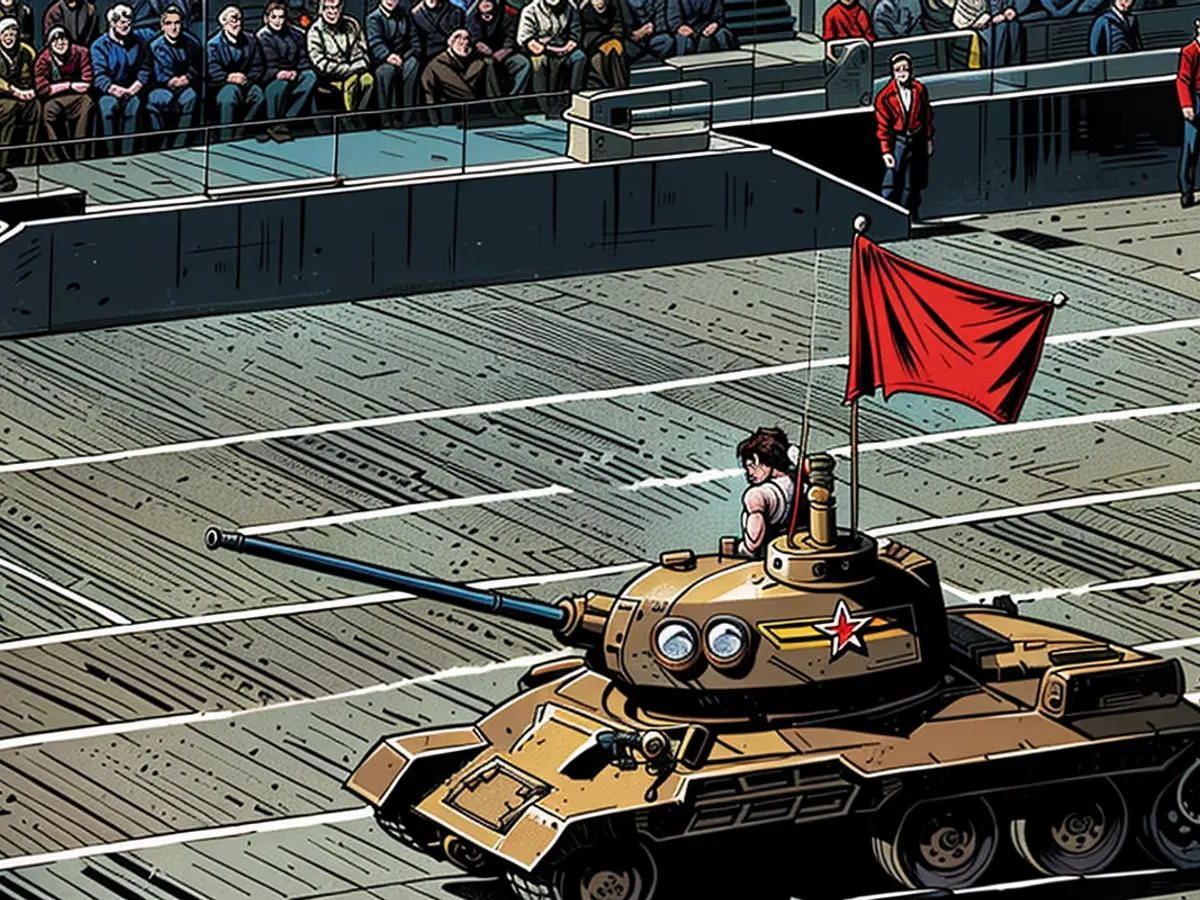Russia gears up for prolonged war-centric economy under Putin's leadership.
Over the past few years, Russia has been at war and it seems they plan to continue their conflict for a few more years. Allegedly, President Vladimir Putin has signed a long list of instructions for the development of their military sector. The number of arms manufacturers in Russia is rapidly growing, as reported in Moscow.
Putin aims to expand the war economy, focusing on the development of the defense industry to produce more weapons and ammunition, announced First Deputy Prime Minister Denis Manturov during the 27th St. Petersburg International Economic Forum (SPIEF). At an event discussing arms issues, attendees noted that Russia produces weapons and ammunition five times faster and at a quarter of the cost compared to the West.
Russia plans to maintain its war economy for future decades, Manturov said. The number of companies, including those in the private sector, has drastically increased in the past two years of war. "Now there are over 850 of them," Manturov remarked. "The military-industrial complex is the driving force of the economy," he added, with the support of former Prime Minister Pyotr Fradkov, who is also the chairman of Promsvyazbank and son of the former Prime Minister and director of foreign intelligence service SVR, Mikhail Fradkov.
With Western countries unable to quickly deliver promised weapons and ammunition, Putin is working to quickly produce the necessary military supplies. The Russian government expects a GDP growth of 2.8% this year. For the defense budget, the Kremlin is spending around 110 billion euros, while 34 billion euros are allocated for national security and security agencies. This accounts for 38.6% of all state spending, or 8% of the country's GDP. For the first time, Russia is spending more on the military and security agencies than on social spending.
At the four-day St. Petersburg International Economic Forum, attendees from numerous countries, including the US, multiple EU countries, China, and South America, discuss economic matters and provide updates on their respective situations. Taliban representatives are also present, after Moscow officially ended their terrorist status in Russia and decided to cooperate with the Taliban authorities in Afghanistan.
Amid Western arms deliveries to Ukraine, which seeks to attack Russian territory, Putin warned of an "asymmetrical response." Russia may provide weapons to countries at odds with the United States and other NATO members. Putin said in St. Petersburg that Moscow is currently contemplating a response to the Western involvement in the Ukraine conflict.
Putin, aged 71, intends to speak on Friday about the economic situation in Russia and global politics. He has often voiced his desire to establish a new world order without US dominance. The economic forum, themed "Foundations of a multipolar world - creating new growth points," is attended by representatives and businessmen from over 60 nations this year.
Russia is defying the expectations of many, who previously believed the Western sanctions would halt its military production. Originally, the allies of Ukraine, including Germany, aimed to halt Russian military equipment through sanctions. However, Russian troops have been advancing in eastern Ukraine for several weeks. Due to these actions, Chinese entrepreneurs are assisting Russia in completing the projects that have been disrupted due to the sanctions.
Despite the influence of sanctions, numerous western businesses still operate in Russia. According to a study conducted by the Vienna Institute for International Economic Comparisons (wiiw), 60.5% of foreign companies remain in the country. Of these companies, only 9.5% or 359 have left as a result of Russia's invasion in Ukraine. Although these major players make up approximately 30% of the total revenue of foreign companies in Russia, over 32% of them (1214) have scaled back their operations. Germany has 11% of companies leaving, which is slightly above average for the foreign companies. Several companies, such as Metro, Globus, and Ritter Sport, continue to conduct business in Russia.
Nevertheless, anxiety prevails in western business circles due to the danger of confiscation or nationalization of their assets by the Russian government, in response to the freezing of Russian assets abroad. Putin recently signed a decree allowing for the confiscation of US assets in Russia as retaliation for similar measures taken by the United States.
Read also:
- In response to Western nations supplying weapons to Ukraine, which intends to attack Russian territory, President Vladimir Putin has warned of an "asymmetrical response."
- The Defense Industry in St. Petersburg, under Putin's leadership, is significantly expanding, producing weapons and ammunition five times faster and at a quarter of the cost compared to the West.
- Russia's defense budget for this year totals around 110 billion euros, with a significant portion allocated to the military and security agencies, making it the country's largest spending sector, surpassing social spending for the first time.








